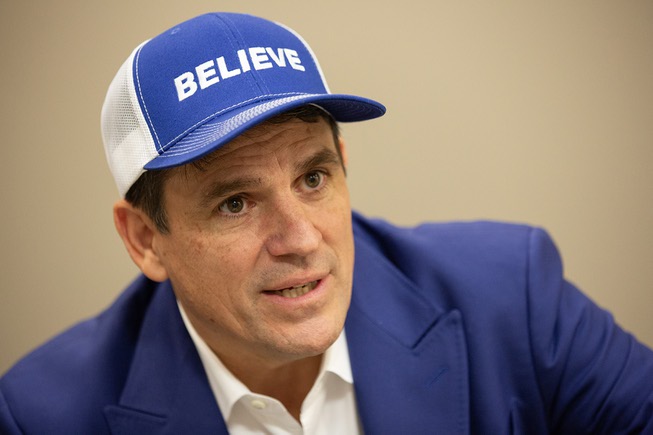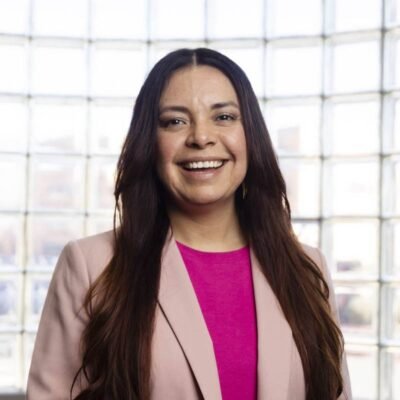
Presidential candidate Ryan Binkley, a Republican businessman from Texas, speaks to voters at the Durango Hills Community Center in Las Vegas Tuesday Jan. 30, 2024.
Sunday, Feb. 4, 2024 | 2 a.m.
Texas Republican Ryan Binkley acknowledges he’s a long shot to be his party’s presidential nominee, but that’s not stopping him from believing he can achieve the impossible and upset former President Donald Trump.
And as he continues to court voters ahead of Thursday’s Nevada GOP caucuses, that belief is on full display.
Speaking to a small group of voters last week at a Las Vegas YMCA, Binkley pitched his vision for the country while wearing a royal blue baseball cap with the word “BELIEVE” scripted across the front. The 56-year-old pastor and investment banker talked about the need for national unity during a time of deep partisan divide.
“President Trump did some good things, but what he can’t do is he can’t unite our country,” Binkley later told the Sun. “There’s a remnant out there that wants something different. And I think in the heart of most Americans, they want something different. They just don’t know how they can have it.”
Binkley is one of two candidates with an active campaign remaining on the ballot for Thursday’s caucuses, the party-run nominating contest the Nevada GOP will use to determine its delegates to the Republican National Convention this summer in Milwaukee.
His opponent is Trump, the overwhelming favorite for the GOP nomination.
Another GOP hopeful, former United Nations Ambassador Nikki Haley, is widely regarded as the most serious challenger to Trump but won’t receive any Nevada delegates because she is participating in the state-run presidential preference primary, and state GOP rules prevent any candidate in the primary field from participating in the caucus.
While conservative notables like Florida Gov. Ron DeSantis and Vivek Ramaswamy have suspended their campaigns and endorsed Trump, Binkley considers the race far from finished.
Binkley said the Nevada GOP has been difficult to work with, but he stopped short of accusing the party of tilting the contest in favor of Trump.
Despite paying the $50,000 fee required to participate in the caucus, it took several attempts for Binkley’s campaign to be given access to voter information the party keeps for outreach purposes — but he notes other states such as Washington and Minnesota also have made it difficult for him to appear on their primary ballots.
A Jan. 9 Emerson College poll of likely Nevada caucus voters (conducted before DeSantis, Ramaswamy or former New Jersey Gov. Chris Christie dropped out) showed Trump getting support from 73% of respondents, while Binkley had polled at just 1%. But in a whittled-down field, Binkley hopes a message that differs from Trump’s can give his campaign the jolt it needs.
“What is the Republican message for the poor? To me, we haven’t had one,” Binkley said. “What I loved about (President Abraham) Lincoln was that he stood for the most disenfranchised, and we’ve gotten away from that as a party.”
One of the pillars of Binkley’s campaign is a renewed citizen volunteer movement that he envisions will rival the once-popular Peace Corps. He also is calling for vocational programs targeted at young Americans, especially targeted at disadvantaged urban youths and immigrants seeking citizenship. That’s coupled with an immigration policy he says will placate both sides of the political aisle: aim to provide undocumented immigrants (including so-called Dreamers) a pathway to citizenship while continuing the Trump administration’s calls for a border wall, reforms to asylum policies and increasing resources and support to border enforcement personnel.
The issue most pressing to Americans, Binkley says, is reining in inflation and strengthening the value of the U.S. dollar. He’s proposed balancing the federal budget by freezing federal spending at current levels until 2031 and mandating increased transparency over the congressional budget process.
Inflation, Binkley argues, is disproportionately damaging to young Americans who likely don’t have so-called “inflationary assets” such as a house or robust investment portfolio — especially compared with the wealthy.
“The biggest threat we face as a nation, to me, it’s not China, it’s not Russia, it’s not the border. It’s the U.S. dollar, and it’s our division,” Binkley said, noting the debt has increased not just under Democratic President Joe Biden, but Trump and others as well.
“They think inflation happened as soon as Joe Biden took office because he had a bad energy policy that contributed to it, but it was not the bulk of the wave. The bulk of the wave is what we’ve done for the last 20 years, and we’ve hit a tipping point.”
Binkley also points to conversations he’s had with young voters who say they feel like they will never be able to own a home, or recent figures put out by the Biden administration that homelessness has jumped 12% in the past year. All of that could be solved, he said, if the dollar was stronger.
“We’re just increasing the money supply, but it’s not in the hands of you and me. It’s in the hands of banks and the debt that we owe. And because of that, everything costs more, but who it’s hurting is everybody who doesn’t own an inflationary asset.”
His message seemed to resonate with the small gathering at the YMCA. Rachel Flowers, 48, called Binkley’s approach refreshing.
“The unity piece of it is really, really important to me. People are so divided right now, and something has to give,” said Flowers, who is registered as an independent voter. “We have to start working together. I’m frustrated by how much bickering there is back and forth, and if someone can get that to change, I’m all for it.”
According to his campaign website, Binkley supports expanding the use of nuclear power and expanding exploration and production of domestic oil, natural gas and coal as well as increasing domestic mining and processing of minerals like cobalt and lithium, used for electric vehicle batteries.
He makes no mention of women’s reproductive rights, but says he will “protect the unborn” and propose reforms to the U.S. foster care and adoption systems, according to his campaign site.
On foreign policy, Binkley believes finding a diplomatic end to the war between Russia and Ukraine needs to happen as quickly as possible, and he is calling on NATO allies to commit at least 2% of their gross domestic production on military spending.
He also believes in strengthening ties with nations in Africa and South America, where he says China is making “significant inroads,” and continuing support for Israel.
Binkley registered a fifth-place finish last month in the Iowa caucuses, getting more votes (774) than Arkansas Gov. Asa Hutchinson (191) and Christie (34), and finished seventh in the New Hampshire Republican Primary eight days later.
The run for commander in chief has been nearly a decade in the making, Binkley said. It started after a dream of him running for office about eight years ago, and similar dreams have persisted ever since, he said.
Whether he’ll run again if he’s not the nominee, Binkley is unsure. So far, Binkley’s campaign has been largely self-funded, although he has also received money from more than 80,000 unique donors.
And that’s why Binkley believes he’s just getting started. Even with the Nevada Republican caucuses being all but Trump’s to lose, Binkley said he believed the nomination should be earned and not given.
“I feel called to keep speaking this out until enough people want to hear it,” said Binkley, who added he wouldn’t run as a third-party candidate.
And he voted for Trump in 2016 and 2020, saying, “I’m a Republican, and I will support our candidate 100%.”
Democrats also have long shots
Being the incumbent, Biden is all but certain to be the Democratic nominee for November’s general election. But that hasn’t stopped a number of candidates from trying to earn the nomination for themselves.
Entrepreneur Jason Palmer, 52, of Baltimore, is perhaps running the most active primary campaign to primary against Biden. The former deputy director of the Bill & Melinda Gates Foundation, Palmer has also touted his track record of serving in leadership positions at other organizations, and has largely campaigned on Democratic angst of Biden’s age and popularity.
Palmer’s campaign touts him as the “younger, smarter and fresher” alternative to Biden. His economic policy is centered around so-called “conscious capitalism,” defined on his campaign site as a philosophy that promotes economic growth and societal change. That includes programs that invest in vocational training, supporting entrepreneurism and implementing tax reform for companies that give to causes that promote positive social change.
Another long-shot Democrat is Minnesota U.S. Rep. Dean Phillips, who is not on the ballot in Nevada. Phillips has the second-highest campaign fundraising totals with just over $5 million, according to the latest Federal Election Commission financial disclosure, though Phillips himself loaned his campaign $4 million.
That still vastly trails the $89.8 million the Biden campaign reported in receipts. Phillips, who is the only Democrat challenging Biden who has experience as an elected official, has also had problems getting on the ballot in other states: Earlier this week he filed a complaint to the Wisconsin Supreme Court to get on the ballot there, where Biden is the only Democratic primary option.
Biden ran a successful write-in campaign to easily win the New Hampshire primary last month, though Phillips finished second with about 20% of the vote.
Along with Palmer and Phillips, author and spiritual leader Marianne Williamson, who gained notoriety in a 2020 presidential bid that ultimately stalled, is once again seeking the Democratic nomination and is also running a serious primary effort to Biden. Also like Palmer, Williamson has spent extended time in Nevada in recent weeks and is working to court younger voters.
Williamson has focused her campaign on advocating for universal health care, collective bargaining, cost-free higher education and a climate policy that will curtail oil and gas drilling.





